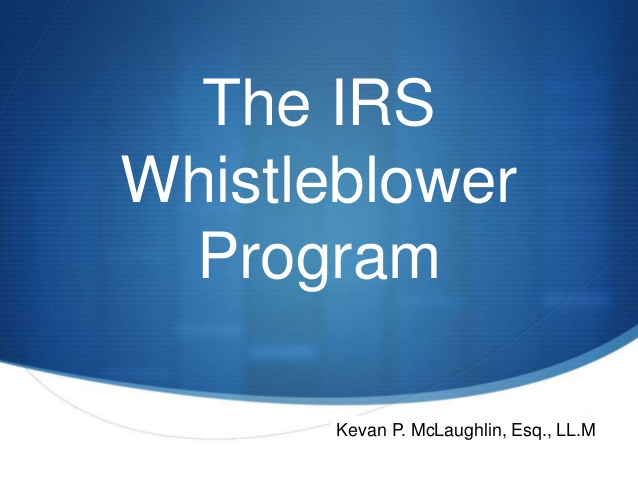On paper, it sounds good. As a concerned citizen, you see something that isn’t right and you do your American duty and blow the whistle. All government agencies have a Whistleblower Program, but none quite as dysfunctional as the IRS’.
For instance, let’s say that you see someone blatantly cheating on their tax return. How the program is supposed to work is you fill out a form, on which you are hypothetically supposed to remain anonymous to the person that you are outing, and then you get a percentage of what the IRS gets in taxes. It is a win-win
IRC § 7623(b)(1) dictates that when the IRS proceeds with an action using the information supplied by an individual, the award the whistleblower is supposed to receive is at least 15 percent, but not more than 30 percent of the total collected proceeds. What makes the difference between 15 – 30 percent? Quite simply, the information that was given substantially contributed to the collection. IRC § 7623(b)(2) dictates the difference. The Code Section says:
(2) Award in case of less substantial contribution
(A) In general
In the event the action described in paragraph (1) is one which the Whistleblower Office determines to be based principally on disclosures of specific allegations (other than information provided by the individual described in paragraph (1)) resulting from a judicial or administrative hearing, from a governmental report, hearing, audit, or investigation, or from the news media, the Whistleblower Office may award such sums as it considers appropriate, but in no case more than 10 percent of the collected proceeds (including penalties, interest, additions to tax, and additional amounts) resulting from the action (including any related actions) or from any settlement in response to such action, taking into account the significance of the individual’s information and the role of such individual and any legal representative of such individual in contributing to such action.
(B) Nonapplication of paragraph where individual is original source of information
Subparagraph (A) shall not apply if the information resulting in the initiation of the action described in paragraph (1) was originally provided by the individual described in paragraph (1).
Not to mention, from the IRS’s website:
Confidentiality of Whistleblower:
The Service will protect the identity of the whistleblower to the fullest extent permitted by the law.
Under some circumstances, such as when the whistleblower is an essential witness in a judicial proceeding, it may not be possible to pursue the investigation or examination without revealing the whistleblower’s identify.
The Service will inform the whistleblower before deciding whether to proceed in such cases.
———–
Okay, now that we have that established, it’s tax time and you are presented with a 1099 from a client that always gives you a W-2 Form. You ask your due diligence questions about the 1099 and you make the determination that your client is an employee. Your client works set hours and his boss exerts control over what your client does. You learn that the employer is treating all of his employees the way that he is treating your client. You explain to your client that they are actually employees and taxes should have been withheld. You explain to your client that he needs to blow the whistle. You go on to explain that it is anonymous, and that there may be a cash reward.
You proceed to file the tax return as if your client is an employee. You explain to him that he has to pay his portion of FICA Taxes, and then you send Form W-7 with the return, explaining that his employer will have to pay the other half of his taxes, and because he wasn’t the only one affected by this, it should open a full-blown payroll tax audit, for which he should be compensated.
Your client is nervous. He loves his job, but just doesn’t want to get hit with a large tax bill year after year. You assure your client that no one will find out.
Your client files the tax return and waits.
Six months later, your client’s boss pulls your client into his office. He thinks it is because he has done a great job, but learns that it’s because his employer found out that he blew the whistle, then he gets fired.
Your client calls you and they are hysterical. Needless to say, you lose that client. This happens more than I want to admit. So much more, that I hardly ever mention it to clients in the same boat.
Now comes the Tax Court Case Smith,148 TC No. 21. Based on the petitioner’s information, the IRS initiated an employment tax and income tax examination of the business. The IRS analyst determined that only a portion of the almost $4 million collected from the business was attributable to the petitioner. The IRS found that the petitioner was entitled to a 10% discretionary award under Section 7623(a). The analyst used Section 7623(a) because, in his view, the “amount in dispute” was less than the $2 million Section 7623(b)(5)(B) threshold so that a mandatory 15% to 30% award under Section 7623(b)(1) was not warranted. Also, the IRS denied an award related to the $14 million in income taxes it collected from the business.
The petitioner’s counsel disagreed with the amount of the IRS’s award. In a Final Decision Under Section 7623(a), the IRS advised the petitioner that, after considering his contentions, the award amount would remain the same.
Section 7623(b)(1) provides that where the IRS proceeds with an action using information supplied by an individual, the award shall be at least 15% but not more than 30% of the collected proceeds, depending on the extent to which the information substantially contributed to the collection. Section 7623(b)(2) addresses circumstances where there is a less substantial contribution on the part of the whistleblower and provides the IRS, in such circumstances, with discretion to award an amount that does not exceed 10%.
Section 7623(b) is available for whistleblower awards only if the Section 7623(b)(5) thresholds are met. The thresholds are such that the subsection will apply with respect to any action: (A) against any taxpayer, but in the case of an individual, only if such individual’s gross income exceeds $200,000 for any tax year subject to such action, and (B) if the tax, penalties, interest, additions to tax, and additional amounts in dispute exceed $2 million.
The court was unable to accept the IRS’s contention that the Section 7623(b)(1) determination of the size or percentage of an award applied to only those portions that were directly or indirectly attributable to a whistleblower’s information or that the IRS’s definition of “amount in dispute” should be employed to determine whether the $2 million threshold of Section 7623(b)(5)(B) was met. The application of the IRS’s position would lead to anomalous results. The petitioner’s whistleblower claim caused the initiation of an examination that resulted in the collection of almost $20 million of tax and penalties, almost $2 million of which was directly or indirectly attributable to the petitioner’s information. In spite of those results, under the IRS’s position, the provisions of Section 7623(b) would not be applicable in this case.
The court next interpreted the term “amount in dispute” by beginning with the statute. Section 7623(b)(5)(B) is plain and has a clear meaning in the context of the section and its intended congressional purpose. The phrase is not specifically limited to only those amounts directly or indirectly attributable to whistleblower information. Once the monetary thresholds are met and the IRS recovers “collected proceeds” resulting from the action, the mandatory provisions of subsections (b)(1) and (b)(2) apply. Conversely, “collected proceeds” as used in the subsections are limited by “resulting from the action” whereas the “amount in dispute” as used in subsection (b)(5) is not.
Here, Section 7623(b)(5) has a clear meaning. Congress intended to limit the nondiscretionary award regime to larger cases where the “amount in dispute” exceeds $2 million. Once that threshold is met, subsections (b)(1) or (b)(2) will apply and award percentages are to be made based on those standards.
According to the court, Section 7623(b)(5) is simply a monetary threshold for application of the less discretionary whistleblower award regime. The $200,000 gross income threshold must be met where the taxpayer is an individual, and the $2 million amount in dispute must be met for any taxpayer. The factors of Sections 7623(b)(1) and (b)(2) limiting the award to a particular portion of collected proceeds focuses on the usefulness of the whistleblower’s claim and should not be a refinement of the “amount in dispute” used in Section 7623(b)(5).
So now even when the whistle is blown, and the person blowing the whistle gets fired, the IRS makes you take them to Tax Court to get your monetary reward. The even funnier part is that they blame practitioners for the tax gap.
Thanks for reading CPA Practice Advisor!
Subscribe Already registered? Log In
Need more information? Read the FAQs
Tags: Taxes





